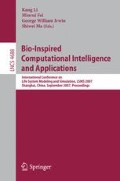Abstract
Ant colony optimization (ACO) is a techniqu1e for mainly optimizing the discrete optimization problem. Based on transforming the discrete binary optimization problem as a “best path” problem solved using the ant colony metaphor, a novel quantum ant colony optimization (QACO) algorithm is proposed to tackle it. Different from other ACO algorithms, Q-bit and quantum rotation gate adopted in quantum-inspired evolutionary algorithm (QEA) are introduced into QACO to represent and update the pheromone respectively. Considering the traditional rotation angle updating strategy used in QEA is improper for QACO as their updating mechanisms are different, we propose a new strategy to determine the rotation angle of QACO. The experimental results demonstrate that the proposed QACO is valid and outperforms the discrete binary particle swarm optimization algorithm and QEA in terms of the optimization ability.
Access this chapter
Tax calculation will be finalised at checkout
Purchases are for personal use only
Preview
Unable to display preview. Download preview PDF.
References
Colorni, A., Dorigo, M., Maniezzo, V.: Distributed optimization by ant colonies. In: Proceedings of ECAL91- European Conf. on Artificial Life, vol. 1, pp. 134–142 (1991)
Dorigo, M., Maniezzo, V., Colorni, A.: Positive feedback as a search strategy. Tech. Report 91-016, Dipartimentodi Elettronica, Politecnico di Milano, Italy (1991)
Dorigo, M., Maniezzo, V., Colorni, A.: Ant system: optimization by a colony of cooperating agents. IEEE Trans. on Systems, Man and Cybernetics-part B 26, 29–41 (1996)
Dorigo, M., Gambardella, L.M.: Ant colony system: A cooperative learning approach to the traveling salesman problem. IEEE Trans. Evolutionary Comput. 1, 53–66 (1997)
Reimann, M., Doerner, K., Hartl, R.F.: D-ants: savings based ants divide and conquer the vehicle routing problems. Comput. Oper. Res. 31, 563–591 (2004)
Liao, C.J., Juan, H.C.: An ant colony optimization for single-machine tardiness scheduling with sequence-dependent setups. Computers & Operations Research 34, 1899–1909 (2007)
Lee, Z.J., Lee, C.Y.: A hybrid search algorithm with heuristics for resource allocation problem. Information Sciences 173, 155–167 (2005)
Stutzle, T., Hoos, H.H.: MAX-MIN ant system. Future Gen. Comput. Systems 16, 889–914 (2000)
Dorigo, M., Blum, C.: Ant colony optimization theory: A survey. Theoretical Computer Science 344, 243–278 (2005)
Blum, C.: Ant colony optimization: Introduction and recent trends. Physics of Life Reviews 2, 353–373 (2005)
Narayanan, A., Moore, M.: Quantum Inspired Genetic Algorithms. In: ICEC 1996. Proc. of the 1996 IEEE Intl. Conf. on Evolutionary Computation, vol. 1, pp. 212–221. IEEE Computer Society Press, Los Alamitos (1996)
Han, K.H.: Genetic Quantum Algorithm and its Application to Combinatorial Optimization Problem. In: IEEE Proc. Of the 2000 Congress on Evolutionary Computation, pp. 1354–1360. IEEE Computer Society Press, Los Alamitos (2000)
Wang, Y., Feng, X.Y., Huang, Y.X.: A novel quantum swarm evolutionary algorithm and its applications. Neurocomputing 70, 633–640 (2007)
Han, K.H., Kim, J.H.: Quantum-inspired evolutionary algorithm for a class of combinatorial optimization. IEEE Transactions on Evolutionary Computation 6, 580–593 (2002)
Han, K.H., Kim, J.H.: Quantum-Inspired Evolutionary Algorithms With a New Termination Criterion,Hε Gate and Two-Phase Scheme. IEEE Transaction on Evolutionary Computation 8, 156–169 (2004)
Kennedy, J., Eberhart, R.C.: A discrete binary version of the particle swarm optimization algorithm. In: Proc. of the l997 Conf. on Systems, Man, and Cybernetics, pp. 4104–4108 (1997)
Blum, C., Dorigo, M.: The hyper-cube framework for ant colony optimization. IEEE Transactions on Systems, Man and Cybernetics, Part B 34, 1161–1172 (2004)
Author information
Authors and Affiliations
Editor information
Rights and permissions
Copyright information
© 2007 Springer-Verlag Berlin Heidelberg
About this paper
Cite this paper
Wang, L., Niu, Q., Fei, M. (2007). A Novel Quantum Ant Colony Optimization Algorithm. In: Li, K., Fei, M., Irwin, G.W., Ma, S. (eds) Bio-Inspired Computational Intelligence and Applications. LSMS 2007. Lecture Notes in Computer Science, vol 4688. Springer, Berlin, Heidelberg. https://doi.org/10.1007/978-3-540-74769-7_31
Download citation
DOI: https://doi.org/10.1007/978-3-540-74769-7_31
Publisher Name: Springer, Berlin, Heidelberg
Print ISBN: 978-3-540-74768-0
Online ISBN: 978-3-540-74769-7
eBook Packages: Computer ScienceComputer Science (R0)

